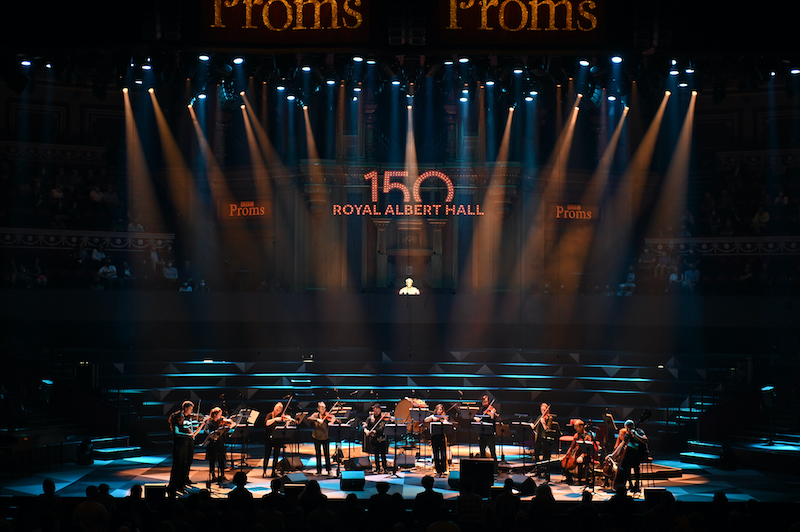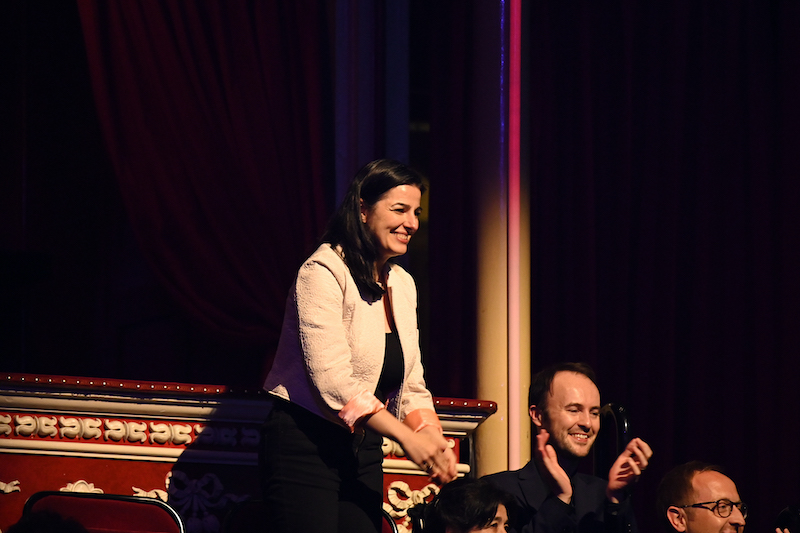Esfahani, Gibson, Manchester Collective, BBC Proms review – variety, but not always in proportion | reviews, news & interviews
Esfahani, Gibson, Manchester Collective, BBC Proms review – variety, but not always in proportion
Esfahani, Gibson, Manchester Collective, BBC Proms review – variety, but not always in proportion
Music for harpsichord and strings ranges from the fierce to the festive

I was looking forward to this Prom by the Manchester Collective, an exciting young group founded in 2016, which has quickly established a reputation for innovative presentation of contemporary repertoire.
There was a nice mixture of in-your-face music – the equivalent of getting stared down by an Indian fast bowler – and a more genial second half. String ensembles often try to sound honeyed and warm, but here the Collective was brittle and edgy, aided by the ubiquitous harpsichord and by music that threatens to generate business for the RSI clinic.
The programme was bookended by harpsichord concertos, played by the charismatic Mahan Esfahani. Henryk Górecki’s, from 1980, is uncompromising and unremitting, playing with ideas of baroque music in a minimalist manner. There is none of the interplay of orchestra and soloist familiar from the classical concerto: here they plough their own furrow, harpsichordist doing frantic finger-exercises and the strings in an inscrutable unison. Only in the second half do things relax a little, with some knowing nods from the composer. Esfahani handled the endless repeated chords (a terrifying technical challenge) with energy and enthusiasm, but it’s a hard piece to love.  Edmund Finnis’s The Centre is Everywhere made a good contrast, starting with “white noise” creaks and scrapes from the strings (subtly amplified, as was the whole programme), opening out into a rich chorale. The lighting effects – dim blue becoming bright uplights – helped delineate this progression, which then reversed, receding to harmonics and darkness. The Collective, playing without a conductor, felt like a single organism, and only at a couple of points in the whole evening did I feel a conductor might have helped (and a few times when one might have made things worse).
Edmund Finnis’s The Centre is Everywhere made a good contrast, starting with “white noise” creaks and scrapes from the strings (subtly amplified, as was the whole programme), opening out into a rich chorale. The lighting effects – dim blue becoming bright uplights – helped delineate this progression, which then reversed, receding to harmonics and darkness. The Collective, playing without a conductor, felt like a single organism, and only at a couple of points in the whole evening did I feel a conductor might have helped (and a few times when one might have made things worse).
Even more uncompromising and fierce than the Górecki was Julius Eastman’s The Holy Presence of Joan d’Arc. The story of the survival of this piece is extraordinary: the music was thrown away when the composer became homeless, but the piece was reconstructed from the tape of a performance that was fortuitously extant. It is a ferocious 20 minutes of rock bass riffs (the main groove was unashamedly lifted from a Patti Smith song) and dissonant upper strings. It defies categorisation or description but the Collective were staunch advocates, bassist Toby Hughes and leader Rakhi Singh busily impressive. But it felt too long for itself, and I had had my fill a bit before the end.  Much more approachable were both Dobrinka Tabakova’s Suite in Old Style and the Jazz Harpsichord Concerto by Joseph Horovitz that rounded off the programme, written in the 1960s by the now 95-year-old composer. The Tabakova (pictured above) takes Rameau as its starting point, although this isn’t especially audible in a piece that more readily conjures Bartók, Ravel, even Vivaldi. Viola soloist Ruth Gibson emerged from the orchestra at the end of the prelude and led the rest of the piece from the front, equally convincing in the quirky waltz and the fugal third movement. The slow movement was gorgeous, Gibson rich and impassioned, but here, as elsewhere, I had some doubts about the proportions of the movements: was the finale long enough to balance the slow music?
Much more approachable were both Dobrinka Tabakova’s Suite in Old Style and the Jazz Harpsichord Concerto by Joseph Horovitz that rounded off the programme, written in the 1960s by the now 95-year-old composer. The Tabakova (pictured above) takes Rameau as its starting point, although this isn’t especially audible in a piece that more readily conjures Bartók, Ravel, even Vivaldi. Viola soloist Ruth Gibson emerged from the orchestra at the end of the prelude and led the rest of the piece from the front, equally convincing in the quirky waltz and the fugal third movement. The slow movement was gorgeous, Gibson rich and impassioned, but here, as elsewhere, I had some doubts about the proportions of the movements: was the finale long enough to balance the slow music?
This was also a problem in the Horovitz in that the addition of long bass and drumkit solos at the beginning and end of the slow movement threw it out of kilter. They were both well-crafted (by Misha Mullov-Abbado and Alan Taylor respectively) but interrupted the flow. The outer movements though were full of wit and fun, Esfahani supple and crisp, the strings revelling in the stylistic switches. The bravura ending was very winning and they should have stopped there: the 12-minute encore was a final indulgence that I could have done without, and a final bit of imbalance.
rating
Explore topics
Share this article
The future of Arts Journalism
You can stop theartsdesk.com closing!
We urgently need financing to survive. Our fundraising drive has thus far raised £49,000 but we need to reach £100,000 or we will be forced to close. Please contribute here: https://gofund.me/c3f6033d
And if you can forward this information to anyone who might assist, we’d be grateful.

Subscribe to theartsdesk.com
Thank you for continuing to read our work on theartsdesk.com. For unlimited access to every article in its entirety, including our archive of more than 15,000 pieces, we're asking for £5 per month or £40 per year. We feel it's a very good deal, and hope you do too.
To take a subscription now simply click here.
And if you're looking for that extra gift for a friend or family member, why not treat them to a theartsdesk.com gift subscription?
more Classical music
 Bizet in 150th anniversary year: rich and rare French offerings from Palazzetto Bru Zane
Specialists in French romantic music unveil a treasure trove both live and on disc
Bizet in 150th anniversary year: rich and rare French offerings from Palazzetto Bru Zane
Specialists in French romantic music unveil a treasure trove both live and on disc
 Scottish Chamber Orchestra, Ibragimova, Queen’s Hall, Edinburgh review - rarities, novelties and drumrolls
A pity the SCO didn't pick a better showcase for a shining guest artist
Scottish Chamber Orchestra, Ibragimova, Queen’s Hall, Edinburgh review - rarities, novelties and drumrolls
A pity the SCO didn't pick a better showcase for a shining guest artist
 Kilsby, Parkes, Sinfonia of London, Wilson, Barbican review - string things zing and sing in expert hands
British masterpieces for strings plus other-worldly tenor and horn - and a muscular rarity
Kilsby, Parkes, Sinfonia of London, Wilson, Barbican review - string things zing and sing in expert hands
British masterpieces for strings plus other-worldly tenor and horn - and a muscular rarity
 From Historical to Hip-Hop, Classically Black Music Festival, Kings Place review - a cluster of impressive stars for the future
From quasi-Mozartian elegance to the gritty humour of a kitchen inspection
From Historical to Hip-Hop, Classically Black Music Festival, Kings Place review - a cluster of impressive stars for the future
From quasi-Mozartian elegance to the gritty humour of a kitchen inspection
 Shibe, LSO, Adès, Barbican review - gaudy and glorious new music alongside serene Sibelius
Adès’s passion makes persuasive case for the music he loves, both new and old
Shibe, LSO, Adès, Barbican review - gaudy and glorious new music alongside serene Sibelius
Adès’s passion makes persuasive case for the music he loves, both new and old
 Anja Mittermüller, Richard Fu, Wigmore Hall review - a glorious hall debut
The Austrian mezzo shines - at the age of 22
Anja Mittermüller, Richard Fu, Wigmore Hall review - a glorious hall debut
The Austrian mezzo shines - at the age of 22
 First Person: clarinettist Oliver Pashley on the new horizons of The Hermes Experiment's latest album
Compositions by members of this unusual quartet feature for the first time
First Person: clarinettist Oliver Pashley on the new horizons of The Hermes Experiment's latest album
Compositions by members of this unusual quartet feature for the first time
 Gesualdo Passione, Les Arts Florissants, Amala Dior Company, Barbican review - inspired collaboration excavates the music's humanity
At times it was like watching an anarchic religious procession
Gesualdo Passione, Les Arts Florissants, Amala Dior Company, Barbican review - inspired collaboration excavates the music's humanity
At times it was like watching an anarchic religious procession
 Classical CDs: Camels, concrete and cabaret
An influential American composer's 90th birthday box, plus British piano concertos and a father-and-son duo
Classical CDs: Camels, concrete and cabaret
An influential American composer's 90th birthday box, plus British piano concertos and a father-and-son duo
 Cockerham, Manchester Camerata, Sheen, Martin Harris Centre, Manchester review - re-enacting the dawn of modernism
Two UK premieres added to three miniatures from a seminal event of January 1914
Cockerham, Manchester Camerata, Sheen, Martin Harris Centre, Manchester review - re-enacting the dawn of modernism
Two UK premieres added to three miniatures from a seminal event of January 1914
 Kempf, Brno Philharmonic, Davies, Bridgewater Hall, Manchester review - European tradition meets American jazz
Bouncing Czechs enjoy their Gershwin and Brubeck alongside Janáček and Dvořák
Kempf, Brno Philharmonic, Davies, Bridgewater Hall, Manchester review - European tradition meets American jazz
Bouncing Czechs enjoy their Gershwin and Brubeck alongside Janáček and Dvořák
 Solomon, OAE, Butt, QEH review - daft Biblical whitewashing with great choruses
Even a top soprano and mezzo can’t make this Handel paean wholly convincing
Solomon, OAE, Butt, QEH review - daft Biblical whitewashing with great choruses
Even a top soprano and mezzo can’t make this Handel paean wholly convincing

Add comment